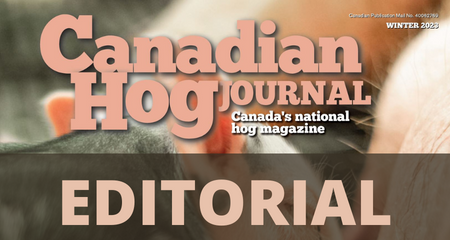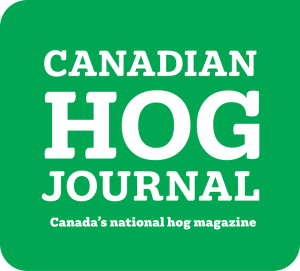
The Winter 2023 edition of the Canadian Hog Journal is here!
‘Innovation’ and ‘technology’ are buzzwords that are sometimes casually thrown around in a lot of industries. Prior to my time in the hog sector, I worked in Alberta’s research and development field, and I witnessed no shortage of empty promises, unfulfilled expectations and failed achievements that were once someone’s great idea and passion – only to fade away before ever becoming reality.
Representing more than just thwarted ambition, these underwhelming initiatives consume a lot of time, human resources and capital, which is perhaps the most regrettable part when they don’t work out. Innovation is a noble principle, and technology can be useful, but what matters most are tangible outcomes, and this edition seeks to shed light on some of the positive work being done when it comes to pigs and pork – going beyond the hype and examining the practical application.
Swine Innovation Porc (SIP) is the agency that has directed research in our sector for more than a decade, with support from provincial pork organizations, in addition to various industry partners, governments and academic institutions. SIP’s Cluster 3 research has just wrapped up, and Cluster 4 has started. Find a recap in this edition and find out what’s ahead.
The mission of Canada’s Agri-Food Innovation Council (AIC) is to be a unifying voice to advance Canada’s cross-sectoral agri-food research and innovation. AIC supports a carbon tax exemption on barn heating fuels, coupled with incentives for change, rather than unfairly punishing producers when they have no other options. Have a look at how AIC is fighting for farmers on the federal level.
When it comes to reducing greenhouse gas emissions, sequestration activities or purchasing offsets are the road-more-travelled if you consider most corporate policies on environmental sustainability. A new advanced pig genetics project by the U.S. National Pork Board and Pig Improvement Company (PIC) is approaching it from a different angle. Learn about why that’s a game-changer.
Measuring the environmental impact of animal agriculture, and communicating it, is yeoman’s work. On one hand, there are plenty of trustworthy folks looking to help farmers succeed, and on the other hand, a small but vocal minority of critics who would rather see them fail. Researcher, professor and presenter Frank Mitloehner is the undisputed champion when it comes to working with the livestock sector to mitigate its environmental impact while also maintaining professional neutrality and open public dialogue. He is widely respected by many for his support of responsible livestock production but reviled by some for his collaborative approach with industry. He recently felt compelled to clarify his stance, following an unprovoked attack by none other than The New York Times.
Three years ago, the Canadian Hog Journal introduced readers to a combined heat and power (CHP) unit that had been newly installed at a Hutterite colony in Alberta. Since then, the decision has proven nothing short of remarkable! The experience has been so encouraging, the colony just bought a second one.
Across Canada, in-person events seem to have fully returned, including the Porc Show in Quebec City and Prairie Livestock Expo in Winnipeg. Get the details here, and read about the 2023 Banff Pork Seminar in our next edition.
My family-of-four is now a family-of-five, as my wife, Kira, and I welcomed our third child and first son, Emeric, in mid-October. His older sisters, Agatha and Wilhelmina, have been enthusiastic little helpers as we learn to navigate and appreciate our new life together.
As always, I can be easily reached by email at deidre.thomas@albertapork.com. You can also get my attention on social media and ‘follow’ the Canadian Hog Journal on Facebook and Twitter (@HogJournal) to contribute to the discussions that matter to you and the rest of the industry!




